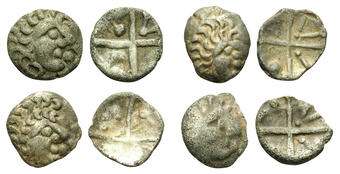I was talking to someone yesterday about the practice of 'a coin for Kharon' upon death. They believed it to be an absolute must--an always applied part of Hellenic burial tradition. It wasn't, actually.
The ancient Hellenes believed that the moment a person died, their psyche--spirit--left the body in a puff or like a breath of wind. Proper burial was incredibly important to the ancient Hellenes, and to not give a loved one a fully ritualized funeral was unthinkable. It was, however, used as punishment of dead enemies, but only rarely. Funerary rites were performed solely to get the deceased into the afterlife, and everyone who passed away was prepared for burial according to time-honored rituals.
They believed the Underworld was a neutral place. One did not desire to go there in the least, but it was part of life, and as far as the afterlife went, it was dull and sunless but nothing like the hell of Christianity. The worst part about it is being without the touch of loved ones, and forgetting who you were.
A burial or cremation had four parts: preparing the body, the prothesis (Προθησις, 'display of the body'), the ekphorá (ἐκφορά 'funeral procession'), and the interment of the body or cremated remains of the deceased. Preparation of the body was always done by women, and was usually done by a woman over sixty, or a close relative who was related no further away from the deceased than the degree of second cousin. These were also the only people in the ekphorá. The deceased was stripped, washed, anointed with oil, and then dressed in his or her finest clothes. They also received jewelry and other fineries. A coin could be presented to the dead, and laid under or below the tongue, or even on the eyes, as payment to Kharon.
The ancient Hellenes believed that the moment a person died, their psyche--spirit--left the body in a puff or like a breath of wind. Proper burial was incredibly important to the ancient Hellenes, and to not give a loved one a fully ritualized funeral was unthinkable. It was, however, used as punishment of dead enemies, but only rarely. Funerary rites were performed solely to get the deceased into the afterlife, and everyone who passed away was prepared for burial according to time-honored rituals.
They believed the Underworld was a neutral place. One did not desire to go there in the least, but it was part of life, and as far as the afterlife went, it was dull and sunless but nothing like the hell of Christianity. The worst part about it is being without the touch of loved ones, and forgetting who you were.
A burial or cremation had four parts: preparing the body, the prothesis (Προθησις, 'display of the body'), the ekphorá (ἐκφορά 'funeral procession'), and the interment of the body or cremated remains of the deceased. Preparation of the body was always done by women, and was usually done by a woman over sixty, or a close relative who was related no further away from the deceased than the degree of second cousin. These were also the only people in the ekphorá. The deceased was stripped, washed, anointed with oil, and then dressed in his or her finest clothes. They also received jewelry and other fineries. A coin could be presented to the dead, and laid under or below the tongue, or even on the eyes, as payment to Kharon.
This ritual was widespread in literature, but archaeological evidence tells us it didn't always happen. In fact, only a small percentage (only about 5 to 10 percent) of known ancient Hellenic burials contain coins. Among these there are widespread examples of a single coin positioned in the mouth of a skull or with cremation remains.
The specific coin presented to Kharon is conventionally referred to in Hellenic literature as an obolos (ὀβολός), one of the basic denominations of ancient Hellenic coinage, worth one-sixth of a drachma, or other relatively small-denomination gold, silver, bronze or copper coin in local use. You are, thus, right that it wasn't solely about the monetary value, but it was definitely something that had to have monetary value. It was also something that you could 'physically' give to Kharon. It as payment, after all: 'I give you this coin and you don't leave me stranded on the banks of the river Akheron to wander around as a shade for all eternity'.
So, the coin was not standard practice, but if you would like to have one, get it recorded that you want to be buried with a coin you buy off the internet, or a low value coin of your local currency, in your mouth. It's not a must, but I admit, it's an idea that appeals to me as well.


No comments:
Post a Comment